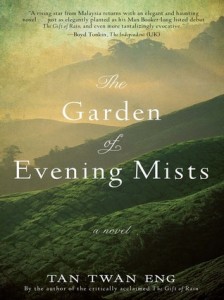A Book Review by Stefanie Field
The Garden of Evening Mists by Tan Twan Eng
 The Garden of Evening Mists has become one of the most popular titles in Malaysian literature. It’s widely recognized in Southeast Asia since it gained fame as the winner of the 2012 Man Asian Literary Prize. The story centers around a Malaysian woman, but ethnically Chinese, in the years just before Malaya’s independence. As a victim of the internment camps during the Occupation, she harbors great rage and hatred against all Japanese people, even utilizing this anger towards her career as a judge in the War Crimes Tribunal. However, she promised to build a Japanese garden in her sister’s memory. When the most prestigious man refuses to design it for her, she undertakes an apprenticeship instead. While despising the country this man represented, she discovers a mystery surrounding him and her past that involves many interested parties including communists, British authorities, Malaysian politicians, and Japanese conservatives.
The Garden of Evening Mists has become one of the most popular titles in Malaysian literature. It’s widely recognized in Southeast Asia since it gained fame as the winner of the 2012 Man Asian Literary Prize. The story centers around a Malaysian woman, but ethnically Chinese, in the years just before Malaya’s independence. As a victim of the internment camps during the Occupation, she harbors great rage and hatred against all Japanese people, even utilizing this anger towards her career as a judge in the War Crimes Tribunal. However, she promised to build a Japanese garden in her sister’s memory. When the most prestigious man refuses to design it for her, she undertakes an apprenticeship instead. While despising the country this man represented, she discovers a mystery surrounding him and her past that involves many interested parties including communists, British authorities, Malaysian politicians, and Japanese conservatives.
Don’t let my summary of the novel convince you this is all about politics. All historical fiction novels involve politics of some kind, but the general mood of this novel is nostalgic romance during a very tense period of Malaya. Nobody knows where the future of Malaya is headed, and every party is fighting for the seat to govern the nation. However, the story starts with the narrator at an elderly age when she attempts to write out her memoir before disease consumes her. The rest of the novel follows her memories as she is intrigued and allured by the former gardener of the Japanese emperor.
Yun Ling is the main character, and she is severely flawed. In a good way. Her character is very stubborn, and very racist against the Japanese. While she is strong-willed in her independence, she harbors immense anger for decades. Slowly, and I mean very slowly, she allows herself to confront the past. Nakamura Aritomo was the gardener of Emperor Hirohito, though his reason for remaining in Malaya is revealed much later in the novel. He doesn’t defend his country or apologize for their actions, but he accepts all of Yun Ling’s prejudice with silent patience. He takes Yun Ling as an apprentice, and she learns about him as much as she learns about Japanese gardens. I felt displaced from their relationship in the novel, almost as if the narrator herself was downplaying the romance although the entire novel alluded to it. The relationship was crucial to the story, but it was not overly prominent. Yun Ling’s fling with Frederick gave a more rounded perspective of herself, but I actually disliked the guy. A lot. Although there was some chemistry, he was as stubborn as Yun Ling and the two seemed to clash more often than get along.
The story is hardly about a romance triangle, though. It’s describes a transition to a postcolonial state of being, a difficult time for the country, its victims of war and conflict, and many survivors. One of the main themes of the book was memories and forgetting, in which memories define a person and forgetting erases their identity. The book displays a very wide web of events and characters, and it does a great job with revealing the interconnections. However, it is a very slow story. I actually fell asleep within the first 60 pages (of the ebook) and I had trouble remaining intrigued by the mystery of the whole novel. At times, it was complicated. At other times, it was very interesting. Nevertheless, the pace was generally quite slow. The writing wasn’t impressive to me, but the story itself was touching.
In the end, I gave it three out of five stars.
✭✭✭✩✩

